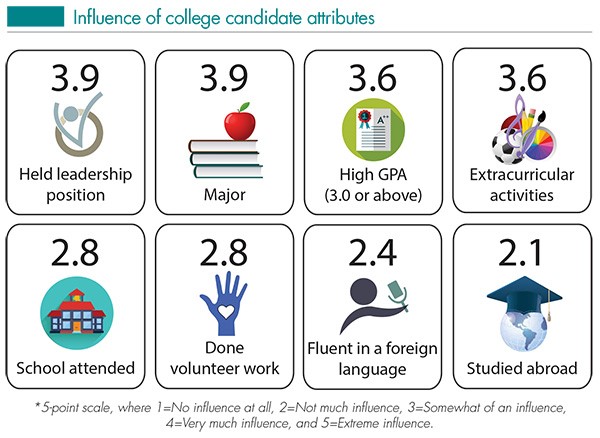“You are not your resume, you are your work.” Seth Godin – author, entrepreneur, marketer
So you’re mid-way through college, and well on your way to reaching all your goals, checking off every category that will make you the top competitor for choice positions in your field. So what does Seth Godin mean by “You are not your resume, you are your work”?
Hey, I’m the last person to suggest that you shouldn’t craft a dazzling resume/profile that highlights all your amazing accomplishments. After all, you have spent your life focusing on being the best you can be, and I’ve spent my life helping the top students land the best careers with the best employers! In fact, your resume/profile really does make a difference – just check out the resume items that influence employers most when they review your credentials:
YOUR RESUME – What Matters Most to Employers
National Association of Colleges and Employers, Your Resume: What Matters Most to Employers Infographic (11/18/2014)
But a more important reality is that your resume can only play one part in getting you an interview. It’s in the interview itself where you have to speak confidently and specifically about how you managed the great – and not so great – experiences you’ve detailed. It is during the interview when being the best and the brightest is really tested, and where you have to prove your resume is backed with talent, self-awareness, and commitment.
The optimal time to prepare for the interview style most employers use today – performance-based interviewing – is while you are engaged in your internships, jobs, academics, volunteer, and leadership experiences! The top candidates succeed by fully embracing each activity, observing and appreciating the value of its opportunities and challenges, and being able to articulate how it prepares them for their careers.
Can you choose your most significant experience and talk comfortably about what you did, how you did it, and why it prepared you for the position you want? While there are many facets to the interview, throughout them all, you need to effectively describe how you already successfully displayed the skills, behavior, and personal traits your interviewer desires.
Understanding the skills and traits you are honing through your most significant achievements and activities is a talent of its own. It requires your early, focused attention and purposeful note-taking. At the same time you must cultivate mentors and others who will want to support your future job search, and make sure you keep them abreast of your activities and interests as you continue your career journey.
Then when the time comes for you to launch your search for your first full-time career position, you will have gained greater clarity about your goals and passions. You will be equipped to share examples from your experiences that demonstrate performance behaviors that are specific, quantifiable, and relatable. And, you’ll have the references to validate your achievements.
Sound like a lot of extra work? It’s not at all! Five simple tips for you to use with each experience NOW will keep you on track to making the best impression possible in your job interviews LATER:
- Listen, observe, and ask questions – don’t just focus on your tasks, pay attention to the people around you and how the organization works.
- Track your projects, your progress toward achieving goals, and make sure you know how they are measured.
- Reflect at the end of each week, jotting down quick bullet points – What have I learned? What did I accomplish? What did I like? What didn’t I like? What are my three take-aways?
- Foster relationships with your supervisors and co-workers – offer support beyond your immediate role; show them you are willing to work hard to learn about the organization.
- Stay in touch when you move on – valuable references are acquired and nurtured over time. They can validate your achievements, introduce you to broader networks, and offer sage guidance for your career advancement.
You are not your resume. You are your internship, your summer job, your leadership role, your volunteer job. Follow these simple tips while you’re living these experiences and you’ll not only be better prepared for your future interviews, you’ll have a crystal clear focus for your professional career!
Kathy L. Sims Vice President, GiftedHire. Former Director of the UCLA Career Center and Past President of NACE

